No game should ever have this amount of hype; all games of sufficient budget are incentivized to have this amount of hype. Somewhere along the line our industry incentives got very messed up, but we don’t have time this week to go all-in on a deconstruction of late capitalism as it relates to cultural production in our current dystopia — we’ve only got time to talk about Cyberpunk 2077.
SPOILER WARNING: This review contains very mild spoilers for the first 10-20 hours of Cyberpunk 2077, centered mainly around Johnny Silverhand.
Cyberpunk 2077 was an early pick for Game of the Year of when it was announced with a tentative April 2020 release date at E3 2019; we hardly need to go through the motions at this point explaining what went wrong from there, but suffice it to say, it was The Last of Us 2 that every games journalist remembered existed long enough to hang those laurels around its head before kicking it back down the memory hole. Cyberpunk released too late in the year to qualify for most award lists, and that might be a good thing; it’s certainly better positioned to have a strong post-release reputational rebuild and surge later in 2021 as the gaming equivalent of Comeback Player of the Year than it is to pull a turnaround capable of winning it Game of the Year over TLOU2, Hades, or even FF7R in the last fifteen days of this calendar year.
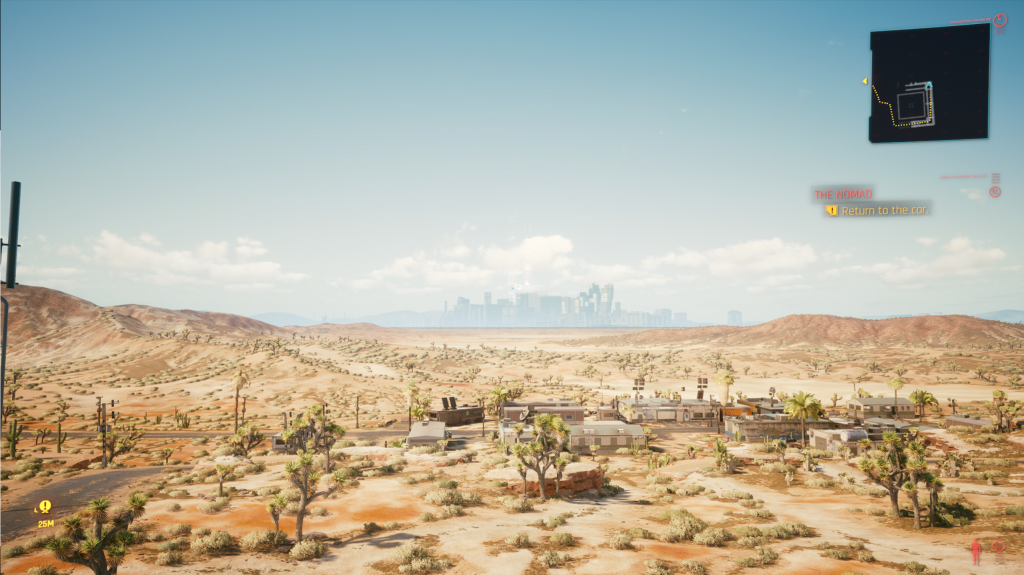
The game that CD Projekt Red shipped was not the game that was promised — though perhaps “promised” is the wrong word. The game that they shipped was not the game that its endless, incredibly loud and occasionally coyly misleading hype engine had convinced a number of players was coming. There were, of course, features that were integral parts of the bundle that got this snowball rolling downhill in the first place, that were cut for either design reasons (such as robust wall-running and truly three-dimensional traversal mechanics), or put on the backburner (such as the multiplayer, which now looks less like a multiplayer and more like a separate product being sold as part of the planned revenue tail for the game, like Grand Theft Auto Online was to GTA V and Red Dead Online was to Red Dead Redemption 2). I don’t think anyone would (or credibly could) accuse CDPR of pulling a Peter Molyneux on Black & White or Fables, mainly because I think Molyneux’s promises in the press junkets previewing those games were tantamount to criminal fraud; CDPR just let players dream about what Cyberpunk 2077 might be, and weren’t particularly interested in bursting any particular bubble their fans might come up with.
And so on final analysis, they seem to have shipped a game that seems little more or less than a sumptuously-realized, open-world Deus Ex title with a far inferior creative license. Hell, licensing the Syndicate IP would have been a better move than the cult-classic tabletop Cyberpunk 2020 setting, but EA owns that and it’s not going anywhere. So players are sort of stuck with a world that feels suspiciously constrained by the pushes and pulls of being written by Generation Xers that believed their own bullshit. For instance, Johnny Silverhand, the guy played by Keanu Reeves, is a rock star terrorist who sold out so thoroughly that you can pick up his character’s albums all over the world and they’re classified as Junk that’s automatically broken down into scrap, and who is absolutely unable to stop constantly lecturing you about authenticity, idealism, and, when the subject comes up, the DIY punk scene that existed in the game’s past.
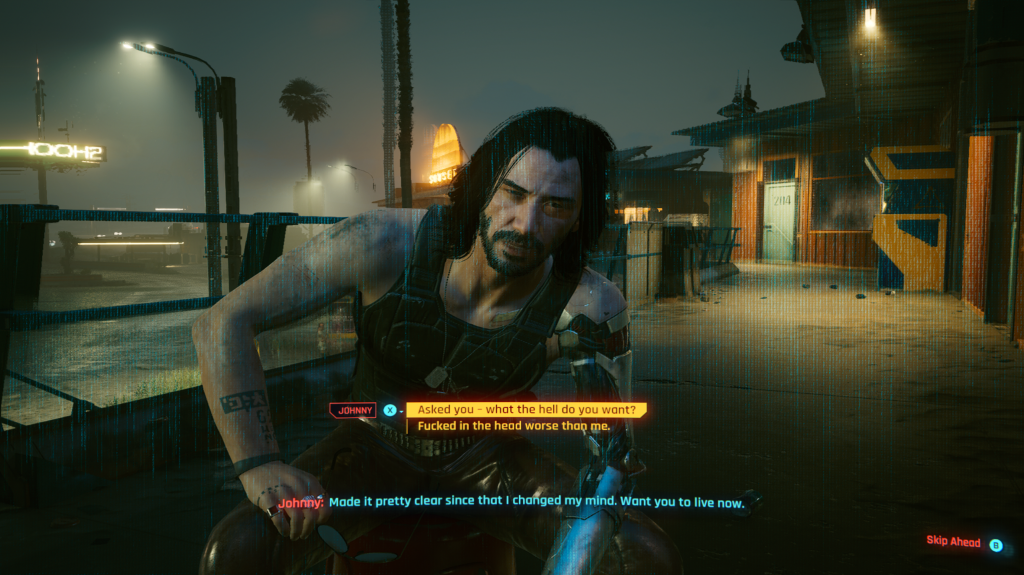
Silverhand gets first mention ahead of the world or the lore or even the player character known only as V, because he is the focal point of the experience once you get through the game’s extended prologue. His primary literary referent is a sort of revealed Tyler Durden from Fight Club — he inhabits your body, exists as a hallucination only you can see, and has a lot of very authoritative thoughts about politics that you’re rarely given great grounds to challenge him on, at least early on in the story. It’s very striking, actually, how often V’s retorts to Johnny on this or that moral question boil down to either demurring on the question at hand or whining at Silverhand that he’s a terrorist. Mind, you can play a version of the character V who doesn’t do terrorism, but the game is much more fun if you actually engage with the sidequests, which turn you essentially into a gig worker at the Uber for mass shootings. Players can even contrive to put their V in the strange position of rhetorically defending cops against Johnny’s depredations. It’s rather more difficult to find options (again, early on) where V can put Johnny on the spot for, say, engaging in terrorism to the detriment of his goals; usually whenever someone notes that Silverhand nuking the Arasaka Tower in his swan song didn’t actually have any cultural or political impact, it’s Johnny himself, complaining about the failures of those who came after him.
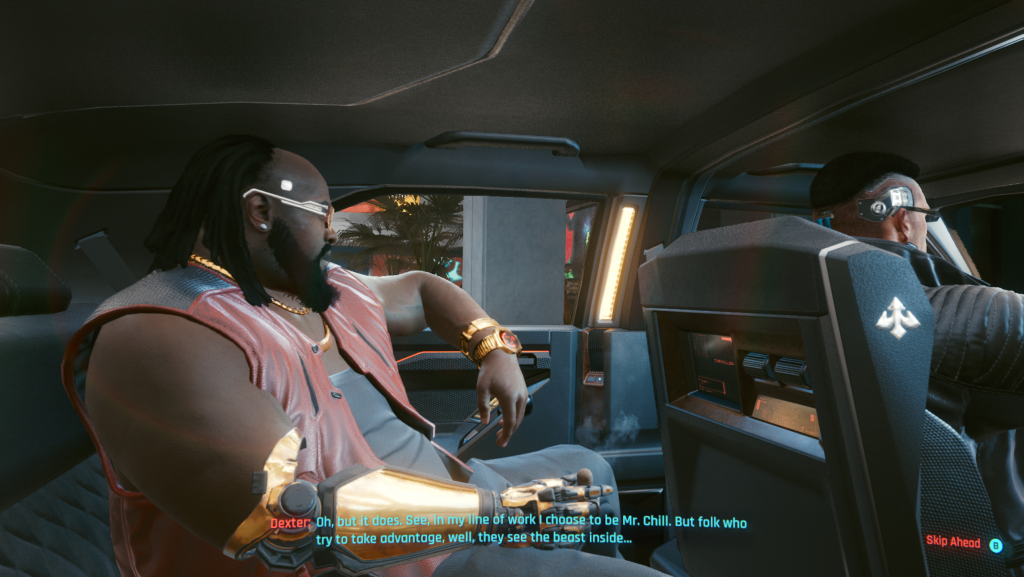
While Keanu Reeves would likely fit much better in this game playing the bitter ghost of say, Adam Jensen in a licensed Deus Ex property, this is not a Kiefer Sutherland Metal Gear Solid V situation where they had the actor for a couple afternoons and had to work around the lack of content. He is all over this game and is one of its clear merits; if you like Keanu doing his modern Keanu thing with his modern Keanu delivery, you will get him doing that while talking about e.g. his impressive cock. This is good, because outside of him and a couple other key NPCs (Panam, a nomad tech sniper having family issues, and Takemura, an aging Japanese bodyguard who failed to protect his master and very clearly hates being in the cyberpunk genre are the other two key standouts), the world of Night City…doesn’t have much to commend it. Most of the other setting NPCs that clearly came from the book are either too-cool-for-school bosses in the “this person gives you jobs” sense, or, more often, bosses in the “you must fight and kill this person” sense. The city streets don’t feel lived in at all; there’s an expectation in games like these now that if they don’t have a true radiant AI system like those in the Elder Scrolls and Fallout games that lead to NPCs doing ridiculous nonsense in the name of “jank,” there’s some kind of simulative aspect to make the world feel alive. But the people of Night City very clearly spawn and despawn only in relation to you, the player-character, only exist so long as you are looking directly at them (even this isn’t guaranteed; the algorithm is messy and will lead to the game despawning people as you watch them walking down the street), and only do one of precisely three things: saunter forward in a predetermined, basic route; crouch when guns are fired nearby (there is only one animation set for this); and run when someone near them gets killed (there is only one animation set for this). The game gives you an open world that is pretty to look at, but it does not give you a city.
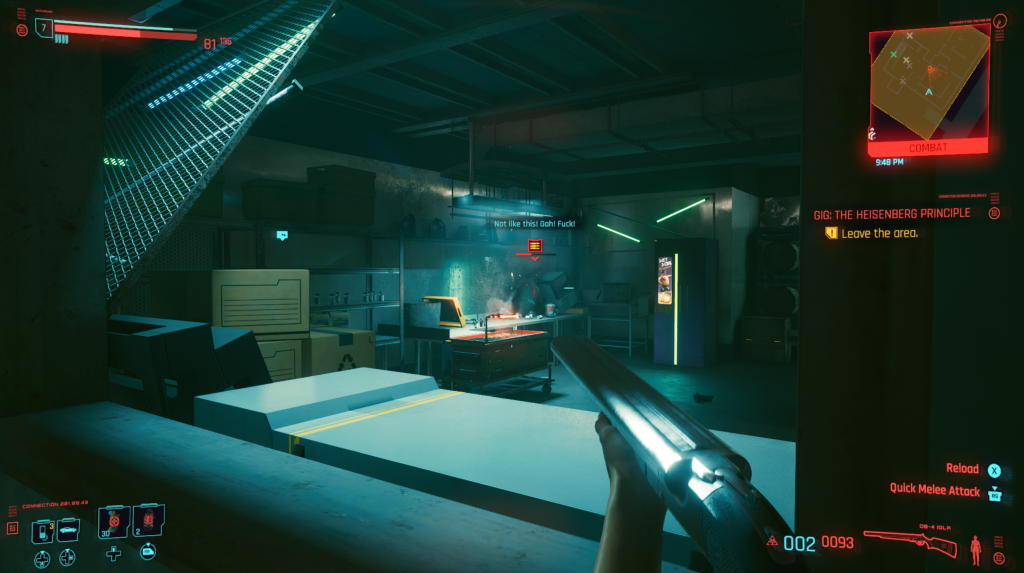
How does it play? It plays well enough! The true merits of the game’s mechanics lie in the amount of stuff available for you to do just by walking around a lot, and how varied they can be. The shooting doesn’t feel as good as Call of Duty’s does, the melee doesn’t feel as good as Mordhau’s does, the sneaking doesn’t feel as good as Deus Ex: Human Revolution’s does, the combat powers don’t feel as good as Syndicate 2012’s do, the hacking doesn’t feel as good as Watch Dogs 2‘s does, the platforming doesn’t feel as good as Mirror’s Edge does, and so on, but — and this is genuinely important — you can do all these things in the same game, you can do them generally competently, and you feel good doing them if you’ve properly specc’d your character in those directions. There is one important exception to this: I do not think I have ever played a game with worse driving than Cyberpunk 2077. Previously my least favorite driving experience in a video game was either Grand Theft Auto IV or the first Mafia and this blows either completely out of the water. Every car handles like it’s being driven drunk underwater, the brake is weak and unresponsive (as far as I can tell there is no handbrake for hairpin turns), and this is in addition to the massive performance problems that crop up when getting behind the wheel as opposed to just walking through the city. Doing missions with mandatory driving sections is a nightmare even if things are working perfectly instead of chunking at 10 frames a second.
That brings us to the question of performance, which is where the game has been most heavily memed-upon. Frankly, I haven’t had many problems at all…but I’m using last-gen hardware that the developers had been working with for years and I’m playing on PC, two very key differences to everyone getting blasted to hell by both the PC release’s issue with new graphics cards and ray tracing and the absolute abomination that is Cyberpunk’s console release, both for the new generation of consoles that has just come out and especially the previous generation, whose versions of the game are unplayable to the point that CDPR has apologized for… hiding that fact from consumers before the game’s launch. I’m running an NVidia GTX 1060 6 GB RAM card with an AMD Ryzen 5 2600, and using the Digital Foundry optimized recommended settings I’ve got a game that looks great, runs acceptably well (not a clean 60 FPS, but I don’t think anyone’s getting that right now), and hasn’t yet crashed to desktop. I don’t have cool ray tracing stuff or 4K, or DLSS, but I do have a game that’s stable and delivers what it says on the tin, which was my big worry going into this.
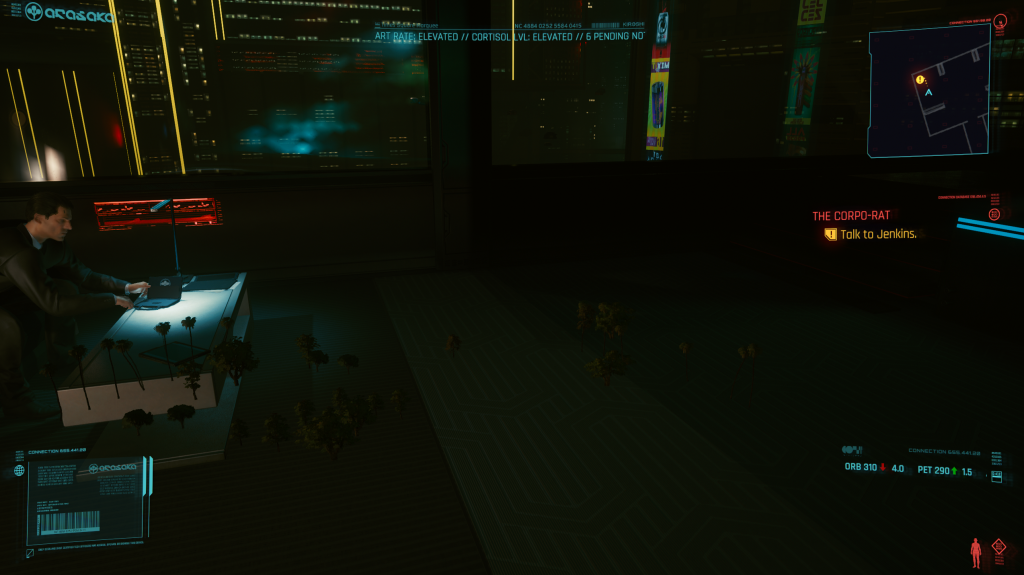
As for the social media angle to the game — the supposed edginess — the game commits the worst possible sin in its actual content: It’s a bore. A lot of words have been written about the rather deplorable, insulting, and transphobic tactics that CD Projekt Red used to promote Cyberpunk 2077, and the culture war they leaned into, but the end product they’ve delivered is silent on basically all of those issues. There is no viewpoint to criticize; there is no “there” there. I’ve heard some critics comment on the game being surprisingly, to them, anti-cop or humanist; I haven’t seen much of that to respect, either, beyond some very banal box-checking about virtuous union organizers getting shot. This is a game that doesn’t really endeavor to have thoughts about things; its storytelling chops certainly don’t even come close to what Witcher III was cooking with by the time its credits rolled, but no one was really expecting that level of commitment to begin with. The game deals with “mature themes” — you will run into child sex traffickers and there’s a quest line that can culminate with you assisting in a snuff film reenactment of Christ’s crucifixion — but its all so much more Whoreson Junior than Bloody Baron. If you’ve played Harebrained Schemes’ Shadowrun trilogy, or Syndicate 2012, or Deus Ex or Deus Ex: Human Revolution, you’re probably going to be left wanting more from what CDPR is bringing to the table here, even in just a basic aesthetic sense. I’d put this alongside the much less-beloved Deus Ex: Mankind Divided, but I think DX:MD’s Prague had a better look. Even the character creator is remarkable less for its bio-determinism with sex and gender than it is for really just…not having all that many choices on offer.
Final Verdict
All of that said, I’m enjoying my time with the game and will continue to enjoy my time with the game — given the crucial caveat that it runs perfectly acceptably on my system and the worst bugs I’ve experienced have been amusing graphical glitches. Cyberpunk 2077 is clearly not ready for all machines or platforms and was pushed out the door for quarterly accounting reasons, not because the game was actually done or in an acceptable state. We don’t give number scores out on this site, but if we did, I’d be much more aligned with the 7/10 crowd than the 9/10 crowd. I’d only go to 8 if I could make it clear that in its current state, running perfectly for me without the technical issues plaguing the release, I’m still only inclined to go to, say, 8.5. And I’m probably in the top 90th percentile of users when it comes to the play experience. Either you’ve bought Cyberpunk 2077 already and my recommendation is moot, or you’re waiting-and-seeing; if you’re in the latter category, wait-and-see a little while longer. Not necessarily until it goes on sale, maybe, but until the clear and concerning issues with just running the damn game are fixed.


